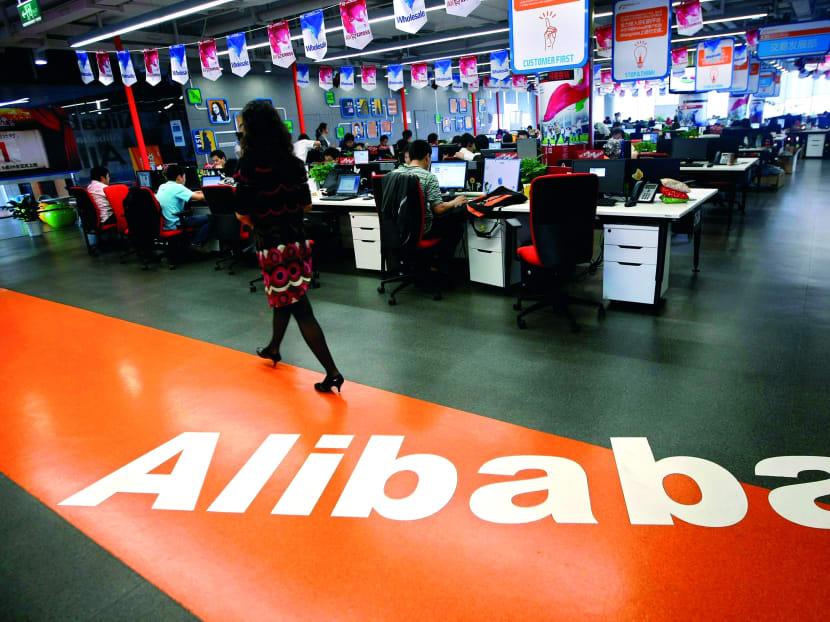Alibaba adds S$870 million deal to shopping cart
HONG KONG — China’s Internet behemoths continued their shopping spree yesterday, with Alibaba Group announcing it would pay HK$5.37 billion (S$873 million) for a stake in a Chinese department store operator.

Alibaba headquarters in Hangzhou, Zhejiang province. The e-commerce giant will form a venture in China with Intime. It will own about 80 per cent of the venture, with Intime controlling the rest. Photo: Bloomberg
HONG KONG — China’s Internet behemoths continued their shopping spree yesterday, with Alibaba Group announcing it would pay HK$5.37 billion (S$873 million) for a stake in a Chinese department store operator.
The investment will give Alibaba a stake of 35 per cent in Intime Retail Group and help China’s biggest e-commerce operator integrate online and offline shopping.
Alibaba and its closest Chinese rival, Tencent Holdings, have carried out a flurry of deals in recent months as each seeks to shore up their market positions and expand into new business lines.
By buying a stake in a brick-and-mortar retailer, Alibaba said it was seeking to leverage its huge base of online shoppers and its technological know-how to increase sales at Intime, which operates 36 department stores and shopping centres across China.
“We see significant opportunities to extend our e-commerce platform to physical retail, developing a more engaging, omni-channel and digitally-connected shopping experience,” Mr Daniel Zhang, Alibaba Chief Operating Officer, said in a statement yesterday.
A partnership with Intime will allow for the increased integration of online technologies at physical points of sale, Mr Zhang said.
Under the terms of the deal, Alibaba will acquire a 10 per cent stake in Intime by buying 220.5 million new shares at HK$7.53 apiece — a discount of 13.7 per cent to the stock’s last trading price before the deal was announced.
Intime will also issue HK$3.7 billion worth of convertible bonds to Alibaba, which will pay 1.5 per cent annual interest.
The bonds can be exchanged for 489.6 million shares in the department store operator — or an additional stake of about 25 per cent.
The two companies will form a venture in China, using shopping malls, department stores and supermarkets to develop an online-to-offline business.
Alibaba will own about 80 per cent of the venture, with Intime controlling the rest.
Online-to-offline businesses seek to benefit from the meteoric rise of smartphone use in China and can help turn a search into a shopping trip or meal based on the user’s location.
“By having department stores on the books, it will be a lot easier for them to integrate their virtual monopoly,” said Mr Mark Tanner, Founder of China Skinny, a Shanghai-based research and marketing agency.
Alibaba’s Tmall.com will have access to Intime’s inventory, broadening the variety of merchandise available, and customers can pick up online orders at Intime stores, said the companies’ statements.
Alibaba billionaire founder Jack Ma said in March last year his goal was to create a delivery network that can reach any place in China within 24 hours. To make that happen, Alibaba joined five delivery companies and other partners to found Cainiao Internet Technology.
Alibaba has said Cainiao will invest as much as 100 billion yuan ($16 billion) within eight years to develop and manage a logistics network.
Shares in Intime, which is listed in Hong Kong, soared after the deal was announced, despite the company issuing new shares at a discount to its previous close — a phenomenon some investors have referred to as “Alibubbles”.
The stock rose as much as 17 per cent to a high of HK$10.60 apiece in early trading yesterday, but later closed down nearly 7.8 per cent at HK$8.33.
The purchase comes as Alibaba starts its preparations for an initial public offering set to be the biggest technology listing ever, surpassing Facebook’s US$16 billion listing in 2012.
In recent months, Alibaba has been on a shopping spree, spending more than US$2.7 billion to expand into media, chat services and mapping technology.
The expansion has encroached on the turf of social networking giant Tencent Holdings, which has in turn made inroads into Alibaba’s territory with its partnership with China’s No 2 online retailer JD.com. Agencies





